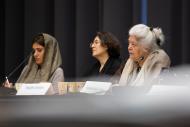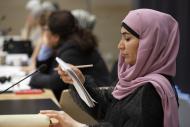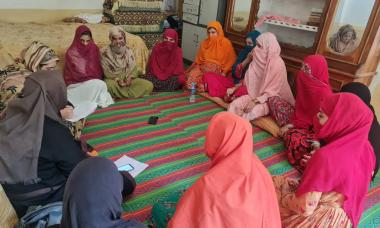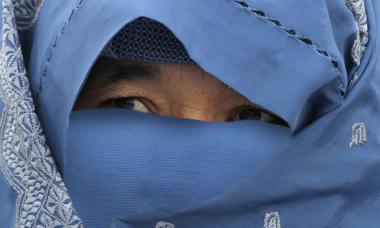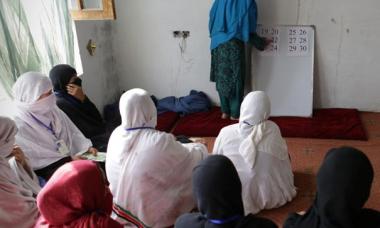
“Where I Am Going and Where I Am”
The personal and professional opportunities and challenges facing Afghan women human rights defenders outside Afghanistan
Hear from Afghan women human rights defenders outside Afghanistan
A POLICY BRIEF AND REPORT BASED ON INTERVIEWS WITH AFGHAN WOMEN
In August 2021, many Afghan women’s rights activists (WRAs) and women human rights defenders (WHRDs) fled Afghanistan out of fear for their safety and security under the new regime. Nearly a year later, Women for Women International and the Women’s International League for Peace and Freedom (WILPF) share a report and policy brief outlining key findings and recommendations based on research and outreach to Afghan WRAs/WHRDs that have continued their advocacy for women in Afghanistan – from all over the world. Their insights help us understand how we can support them in overcoming their personal and professional challenges as refugees and asylum seekers, as well as how to take advantage of the opportunities to support their work and leadership of the Afghan women’s rights movement.
"As a human being I have to understand where I am going, and I have to be able to choose where I am."
We mapped 1,160 Afghan women human rights defenders (WHRDs) who are currently based in five geographic regions around the world and conducted follow-up focus group discussions (FGDs) and interviews with 53 of the women. The findings from our research contributes to filling the current information gap around Afghan women’s rights activists (WRAs) and WHRDs’ immediate, medium, and long-term needs in the transit and host countries where they reside, their areas of expertise and experience, and their ideas, capacities and opportunities on how to sustain the Afghan women’s movement jointly, despite being apart geographically.
Based on the experiences and perspectives shared by Afghan WRAs and WHRDs in the course of our research, we present evidence-based recommendations which pave the way for donors, policymakers, and partners to support the Afghan women’s rights movement through diplomatic efforts and future programming and projects to sustain Afghan women’s rights movements inside and outside Afghanistan.
LEARN MORE
Read the Policy Brief and Mapping Report to learn more about the experiences of Afghan women human rights defenders and key recommendations for the international community.
What did we hear from the Afghan WRAs and WHRDs?
- The key personal and professional challenges that Afghan WRAs and WHRDs cited are:
- Resettlement: Immigration Status and Documentation/Identification
- Lack of transparent immigrant and resettlement processes
- Restrictions and lack of clarity around policies for refugee and asylum seeker advocacy and activism;
- Discrimination in policy and attitudes; and
- Professional uncertainty in host countries.
- Financial Challenges and Unemployment
- Economic integration in host countries
- Increasing living cost and daily necessities (after Ukraine war) without any changes in financial status of WRA’s and WHRD’s,
- Financial barrier such as restricted access to bank, withdrawal, and money transfers.
- Security
- Cybersecurity including concerns around tracking of online activity and access to secure internet;
- Regressive policies and restrictions on operations within Afghanistan
- Mental Health and Psychosocial Support
- Afghan WRAs and WHRDs need greater access to mental health and psychosocial support and services, but they also emphasized that addressing the other personal and professional challenges and needs listed above are also critical to improving their mental health and wellbeing.
- Resettlement: Immigration Status and Documentation/Identification
What do Afghan WRAs and WHRDs want from the international community?
The international community has a role and a responsibility to Afghan women residing inside and outside Afghanistan. Over the past year, the international community has under-delivered on their promises and responsibilities. Urgent, coordinated action should be taken to ensure that the resettlement challenges, financial needs, security concerns, and mental health and psychosocial support identified by Afghan WRAs and WHRDs in transit or in host countries are addressed based on recommendations set forth in the policy brief.
The personal and professional challenges facing Afghan WRAs and WHRDs and identified through our research are intimately related. Therefore, to sustain the Afghan women’s rights movement and Afghan WRAs and WHRDs professional capacities, the international community must also address the mental health challenges and personal capacity of Afghan WRAs and WHRDs outside of Afghanistan.
“We call on the international community to help Afghan women, both inside and outside Afghanistan, determine their own destiny and become masters on their own two feet, able to defend their rights and use their expertise. Unfortunately, the expertise and experience of Afghan women have all been razed to the ground.” -Afghan WRA/WHRD based in United Arab Emirates
To sustain the Afghan women’s rights movement and support the achievement of the movement’s objectives, decision-makers must actively seek and act upon input and leadership from Afghan women, WRAs, and WHRDs within and outside of Afghanistan. By addressing the personal and professional challenges facing Afghan WRAs and WHRDs with policy action and resources, the international community can remove barriers to their leadership and support them in sustaining the movement for their own rights.
LEARN MORE
Read the Policy Brief and Mapping Report to learn more about the experiences of Afghan women human rights defenders and key recommendations for the international community.

